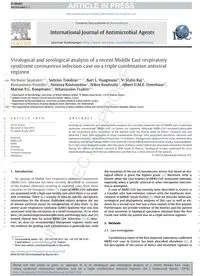
2014 Virological and serological analysis of a recent Middle East respiratory syndrome coronavirus infection case on a t PDF
Preview 2014 Virological and serological analysis of a recent Middle East respiratory syndrome coronavirus infection case on a t
Please cite this article in press as: Spanakis N, et al. Virological and serological analysis of a recent Middle East respi- ratory syndrome coronavirus infection case on a triple combination antiviral regimen. Int J Antimicrob Agents (2014), http://dx.doi.org/10.1016/j.ijantimicag.2014.07.026 ARTICLE IN PRESS G Model ANTAGE44091–5 International Journal of Antimicrobial Agents xxx (2014) xxx–xxx Contents lists available at ScienceDirect International Journal of Antimicrobial Agents journal homepage: http://www.elsevier.com/locate/ijantimicag Virological and serological analysis of a recent Middle East respiratory syndrome coronavirus infection case on a triple combination antiviral regimen Nicholas Spanakis a,1, Sotirios Tsiodras b,c,1, Bart L. Haagmans d, V. Stalin Raj d, Q1 Kostantinos Pontikis e, Antonia Koutsoukou e, Nikos Koulouris e, Albert D.M.E. Osterhaus d, Marion P.G. Koopmans d, Athanassios Tsakris a,∗ a Department of Microbiology, University of Athens Medical School, 75 Mikras Asias Street, 115 27 Athens, Greece b Hellenic Centre for Disease Control and Prevention, Athens, Greece c Department of Internal Medicine, University of Athens Medical School, Athens, Greece d Department of Viroscience, Erasmus Medical Center, Rotterdam, The Netherlands e First Department of Respiratory Medicine, University of Athens Medical School and ‘Sotiria’ Chest Diseases Hospital, Athens, Greece Q2 a r t i c l e i n f o Article history: Received 25 July 2014 Accepted 28 July 2014 Keywords: MERS-CoV MERS Serology Coronavirus Antiviral treatment Phylogeny a b s t r a c t Serological, molecular and phylogenetic analyses of a recently imported case of Middle East respiratory syndrome coronavirus (MERS-CoV) in Greece are reported. Although MERS-CoV remained detectable in the respiratory tract secretions of the patient until the fourth week of illness, viraemia was last detected 2 days after initiation of triple combination therapy with pegylated interferon, ribavirin and lopinavir/ritonavir, administered from Day 13 of illness. Phylogenetic analysis of the virus showed close similarity with other human MERS-CoVs from the recent Jeddah outbreak in Saudi Arabia. Immunoglobu- lin G (IgG) titres peaked 3 weeks after the onset of illness, whilst IgM levels remained constantly elevated during the follow-up period (second to fifth week of illness). Serological testing confirmed by virus neutralisation assay detected an additional case that was a close contact of the patient. © 2014 Published by Elsevier B.V. 1. Introduction An upsurge of Middle East respiratory syndrome coronavirus (MERS-CoV) infection has been recently described in countries of the Arabian Peninsula resulting in exported cases from these countries to the European Union [1]. Cases of MERS-CoV infection are associated with a high case fatality rate since there is no avail- able treatment. There is a scarcity of data on specific therapeutic interventions for the disease. Published reports propose the use of known antivirals based on extrapolation of data from: (i) the severe acute respiratory syndrome (SARS) epidemic that was also associated with the circulation of a novel coronavirus; (ii) in vitro data; (iii) animal experimental infections and therapy data; and (iv) limited clinical data for actual MERS-CoV infections [2–4]. How- ever, no clear-cut recommended therapeutic regimen exists and the evidence for grading such interventions is generally low, with ∗ Corresponding author. Tel.: +30 210 746 2011; fax: +30 210 746 2210. E-mail address:
